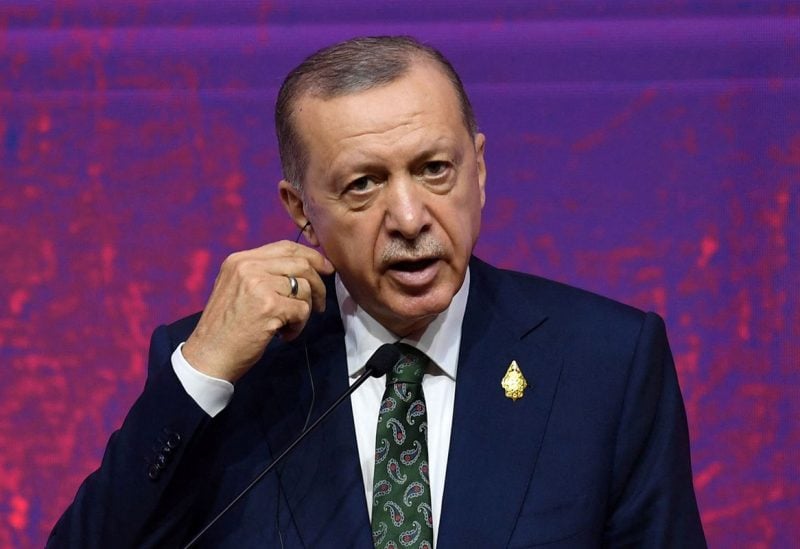
President of Turkey Recep Tayyip Erdogan delivers his messages to the journalists in G20 Summit's news conference in Media Center, BICC, Nusa Dua, Badung Regency, Bali, Indonesia, November 16, 2022. ADITYA PRADANA PUTRA/G20 Media Center/Handout via REUTERS
Four sources with knowledge of the situation told Reuters that the draft electoral platform of Turkish President Tayyip Erdogan’s AK Party represents a return to more conventional, free market economic policies.
On May 14, Turkey will hold presidential and legislative elections, and according to polls, Erdogan will face his worst electoral threat to date in his 20 years in office.
The decline in living conditions brought on by the weakening of the Turkish currency at a time when Ankara started following a contentious economic model centered on low interest rates has been the key factor affecting Erdogan’s popularity.
In 2021 Turkey embarked on a rate-cutting cycle in the face of soaring inflation, defying traditional monetary policy and running against a global trend of rising borrowing costs.
The Turkish central bank slashed its benchmark rate by 500 basis points in 2021 and then again in 2022, after calls for rate cuts from Erdogan.
Combined with soaring energy and food prices triggered by Russia’s invasion of Ukraine in Feb. 2022, this led inflation in Turkey to spike to more than 85% last year.
Turkey’s fiscal woes were also exacerbated when a huge earthquake struck its southern regions on Feb. 6, leaving millions of people homeless and causing billions of dollars worth of damage.
According to the sources familiar with the draft, the AK’s manifesto for the upcoming election will make no reference to Ankara’s more recent economic policies but instead to return to his party’s prior, more orthodox approach.
The sources, declining to be named as they were not authorised to speak on the subject, also said Erdogan wanted to give a top role in running the economy to former deputy prime minister and finance minister Mehmet Simsek, who is highly regarded in international circles.
Turkish inflation hit a 24-year high above 85% in October, stoked by the series of unorthodox interest rate cuts sought by Erdogan that triggered the lira’s crash in late 2021.
Since August, the currency has been largely stable thanks to authorities’ heavy hand in the forex market.
“The approach to the economy is very similar to that of the 2002 AK Party election manifesto. In other words, the AK Party is returning to its origins,” one government official said about the draft, adding that work on it had reached the final stage.
He said that its priorities included free market economy rules and practices parallel to those applied in the global economy, with “no sign of any kind of non-market practices.”
The AK Party declined to comment on the issue.
Simsek was not available for comment.
A senior AKP official said the manifesto made no reference to the new economy model but emphasised principles previously advocated by the AKP, such as fighting inflation, accountability in the public sector and transparency in tenders.
He said Erdogan’s final approval of the manifesto would be required and so far he had not conveyed any dissenting opinion.
“If he does accept, it will eventually bring radical changes in both the cabinet and the management of the economy,” he said.
Among Erdogan’s goals was the appointment of Simsek.
“All Turkey knows Simsek’s approach and success. If he takes office, a radical change is inevitable in economic policies, the bureaucracy and cabinet members to work in harmony with him,” the AKP official said.
Another source with knowledge of the issue said that as well as the AKP, three parties from the main opposition alliance wanted to work with Simsek.
In 2012, when Simsek was actively involved in running the economy, the foreign share of the lira-denominated bond market peaked around 25%. It stood at 0.8% at end-January, Treasury data shows. Simsek was deputy prime minister until 2018.
Four senior sources in the opposition alliance told Reuters previously that the alliance planned to make former deputy prime minister Ali Babacan a vice president responsible for the economy if it wins the presidential election.
Babacan, like Simsek, is well regarded by foreign investors.
Devastating earthquakes that killed more than 48,000 people in Turkey have further added to the fiscal challenge faced by the government in winning over voters in the May elections.
Following the quakes, the budget deficit surged to 171 billion lira ($9 billion) in February while the trade deficit jumped nearly 53$ to $12.2 billion in the same month.